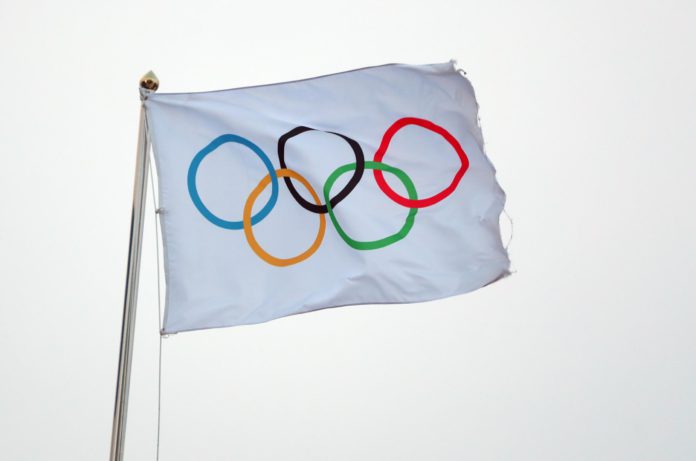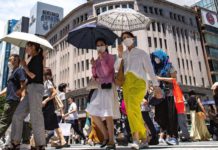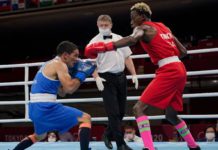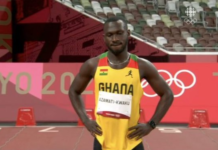
Organisers of the Tokyo Olympics agreed on Thursday to ban fans from the events under a COVID-19 state of emergency.
“We reached an agreement on no spectators at venues in Tokyo,” Japan’s Olympics Minister Tamayo Marukawa said.
The widely expected move – which means the Games will happen mostly behind closed doors – was made following talks between the government, Tokyo organisers, and Olympic and paralympic representatives.
It was “regrettable” that the Games were going to be held in a limited format, Tokyo 2020 President Seiko Hashimoto told a briefing, adding her apologies to those who had bought tickets.
Japan’s Prime Minister Yoshihide Suga said it was essential to prevent Tokyo, where the highly infectious Delta COVID-19 variant was spreading, from becoming the source of another wave of infections.
“Taking into consideration the impact of the Delta strain, and in order to prevent the resurgence of infections from spreading across the country, we need to step up virus prevention measures,” Suga said.
The ban all but robs the Tokyo Games, which are scheduled to run from July 23 to August 8, of their last hope for pomp and public spectacle.
Once seen as a chance for Japan to stand large on the global stage after a devastating earthquake ten years ago, the showpiece event was delayed by the pandemic last year and has been hit by huge budget overruns.
Medical experts have said for weeks that having no spectators would be the least risky option amid widespread public fears an influx of thousands of athletes and officials will lead to a new wave of infections.
Tokyo reported 920 coronavirus cases on Wednesday, the most since May. “The infections are in their expansion phase and everyone in this country must firmly understand the seriousness of it,” Dr Shigeru Omi, a top government medical adviser, said.
The decision to ban spectators is the latest blow to fans after a year’s postponement because of the pandemic, a steady downscaling of events, banning of foreign fans, and then the cap on domestic spectators.
- ‘It’s really regrettable’
A majority of Japanese still oppose holding the Games amid the pandemic and a slow vaccine rollout.
“It’s really regrettable they haven’t been able to stamp out infections here,” said Keiko Otsubo, a woman in her 40s who works for an IT firm and had planned to watch the triathlon.
“If they’d been able to get vaccinations over earlier we could’ve been like America and other places, where everybody’s now going out to sports events just like normal.”
About one-quarter of Japan’s population has been given at least one vaccine dose.
Some fans were upset the final decision on spectators came just two weeks before the start of the Games.
“I’m really annoyed at how long it’s taking organisers to decide,” said Shota Tabara, a 29-year-old who spent 100,000 yen ($912) on tickets to track, volleyball and basketball.
Others said they were now opposed to the Games and would not go even if they could, pointing to media reports that VIPs and some sponsors may still be allowed into events like the opening ceremony.
“It seems like bringing in all these people is just the perfect virus stew to produce another variant or spread the ones we already have,” said Alison, a 42-year-old teacher and long-term Scottish resident of Japan.
She planned to take her parents to the Games and bought nine tickets. She declined to give her last name.
“I think a lot of people feel it’s kind of clear that it’s one rule for the people at the top – and something else for everyone else.”
- ‘Going out for drinks’
The main focus of the emergency declaration is a request for bars, restaurants and karaoke parlours serving alcohol to close.
A ban on serving alcohol is a key step to tone down Olympic-related festivities and keep people from drinking and partying. Tokyo residents are expected to face stay-home requests and watch the games on TV from home.
“How to stop people enjoying the Olympics from going out for drinks is a main issue,” Health Minister Norihisa Tamura said.
The Olympics are pushing ahead against most medical advice, partially because the postponement stalled the International Olympic Committee’s (IOC) income flow. It gets almost 75 percent of its income from selling broadcast rights, and estimates suggest it would lose $3bn to $4bn if the Olympics were canceled.
About 11,000 Olympians and 4,400 Paralympians are expected to enter Japan, with tens of thousands of officials, judges, administrators, sponsors, broadcasters, and media also entering. The IOC says more than 80 percent of residents in the Olympic Village will be vaccinated.






